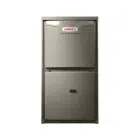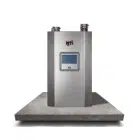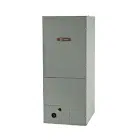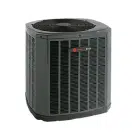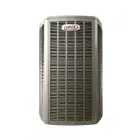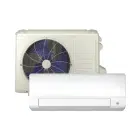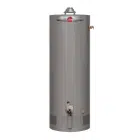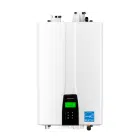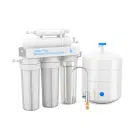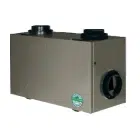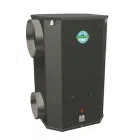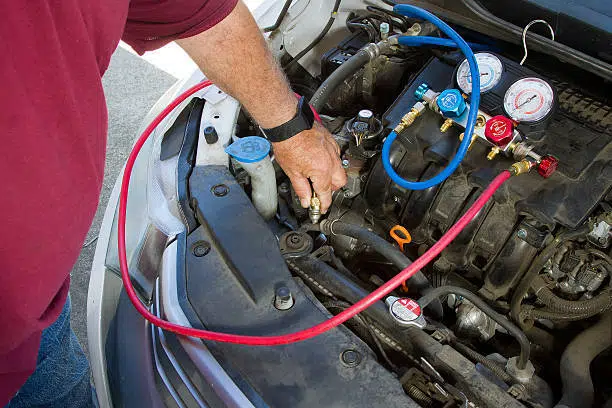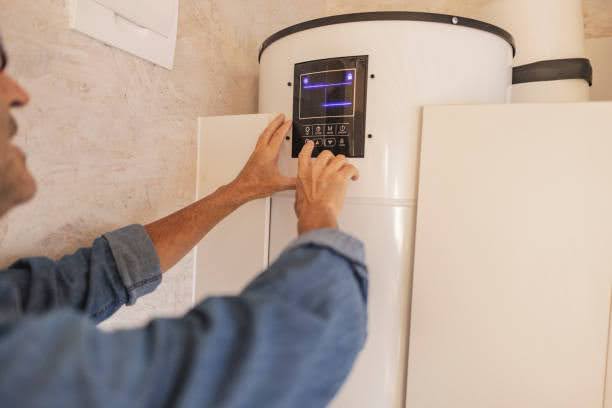
Table of Contents
- Why Your Choice of Water Heater Matters
- Gas Tankless Water Heaters: Pros and Cons
- Electric Tankless Water Heaters: Pros and Cons
- Efficiency: Gas vs. Electric
- Installation Costs: Gas vs. Electric
- Long-Term Savings: Which One Pays Off?
- Performance: Meeting Your Hot Water Needs
- Making the Right Choice for Your Home
- Let Us Help You Find the Perfect Furnace
- FAQ
When it comes to choosing the right tankless water heater for your home, the decision can feel overwhelming. After all, you rely on hot water for everything from showers to dishwashing, so making the wrong choice could affect your comfort and your utility bills. Should you go for a gas water heater or an electric tankless water heater? The answer depends on several factors, including efficiency, installation costs, long-term savings, and performance. Let’s break down what you need to know so you can make an informed choice.
Why Your Choice of Water Heater Matters
In Canada, reliable access to hot water isn’t just a luxury—it’s essential, especially during the colder months. Having the right tankless water heater for your home’s size, energy usage, and family needs can make a big difference in your comfort and your monthly bills. Both gas water heaters and electric tankless water heaters in Canada offer the benefit of endless hot water on demand, but they have different strengths and weaknesses. By comparing them side by side, you’ll get a better sense of which one makes more sense for your home.
Gas Tankless Water Heaters: Pros and Cons
Let’s start with gas-powered tankless water heaters. These units heat water with a gas burner, which allows them to deliver a higher flow rate than their electric counterparts. That’s why gas water heaters are often the go-to choice for larger households or homes with multiple bathrooms. If you’ve got a family that’s constantly using hot water—think back-to-back showers, laundry, and running the dishwasher all at once—a gas tankless water heater is more likely to keep up with the demand.
However, the downside to gas water heaters is the installation process. They require proper ventilation to handle the exhaust gases, and in many cases, this means installing new venting or upgrading existing systems. That can drive up the installation costs, especially if you don’t already have a gas line in place. But if you already use natural gas in your home, like for heating or cooking, a gas tankless water heater could end up being more economical in the long run.
Here’s a quick look at the pros and cons of gas tankless water heaters:
Pros | Cons |
|---|---|
Higher flow rates—better for larger households | Higher installation costs due to venting and gas lines |
Lower operational costs (especially with natural gas) | Requires more maintenance over time |
Suitable for homes with high hot water demand | Not ideal for homes without existing gas infrastructure |
Reliable performance in cold weather | Higher upfront costs compared to electric models |
Electric Tankless Water Heaters: Pros and Cons
Now, let’s talk electric. Electric tankless water heaters are generally easier to install because they don’t need venting or gas lines. That means if you’re in an older home or simply looking for a hassle-free installation, an electric tankless water heater is often the better option. These units are typically smaller and more compact, which makes them a great choice if you’re short on space.
On the other hand, electric tankless water heaters can struggle to keep up with high hot water demands. If you’ve got a larger home or a family that uses a lot of hot water at the same time, you may find that the flow rate isn’t as strong as you’d like. Electric tankless water heaters are best suited for smaller homes, condos, or families with lower hot water usage.
Here’s a breakdown of the pros and cons of electric tankless water heaters:
Pros | Cons |
|---|---|
Easier and cheaper to install—no venting required | Lower flow rates—may struggle in larger households |
Compact and space-saving design
| Higher operational costs in areas with expensive electricity
|
100% energy efficient
| May require electrical upgrades in older homes
|
Great for smaller homes or low hot water demands
| Not ideal for cold climates with high hot water demand
|
Efficiency: Gas vs. Electric
When it comes to energy efficiency, both gas and electric tankless water heaters have their advantages, but it’s not a one-size-fits-all situation. Gas tankless water heaters, particularly condensing units, are highly efficient, with many achieving energy efficiency ratings of up to 95%. This means less heat is wasted, and more of the gas you pay for is used to heat your water. However, these high-efficiency models tend to be more expensive and might not be worth the investment if you don’t have a high demand for hot water.
Electric tankless water heaters, on the other hand, boast near-perfect energy efficiency since they convert all the electricity they consume into hot water. That sounds great, but in real-world usage, they can fall short, especially in larger households. The energy savings you see on paper might not translate to actual savings on your utility bill if you’re running multiple appliances at once.
Here’s a comparison of efficiency for gas vs. electric tankless water heaters:
Installation Costs: Gas vs. Electric
Efficiency | Gas Tankless Water Heater | Electric Tankless Water Heater |
|---|---|---|
Typical energy efficiency rating
| 80% to 95% (condensing units)
| 100% energy efficient
|
Real-world efficiency
| High, especially in colder climates or large households
| Perfect on paper, but may struggle in large homes |
Winter performance
| Performs well even in cold temperatures
| Can struggle in very cold weather, especially in larger homes
|
Upfront installation costs are one of the biggest factors when choosing between gas and electric tankless water heaters. Gas water heaters generally have a higher initial cost due to the need for venting and, in some cases, installing a gas line. Depending on your home’s layout, this could require cutting into walls, running pipes, and more extensive labor. You’re typically looking at a few thousand dollars just for installation, not including the cost of the unit itself.
Electric tankless water heaters, on the other hand, are much cheaper to install. Since they don’t need any venting and can often be connected to your home’s existing electrical system, you’re looking at much lower installation costs. However, if you live in an older home, you may need to upgrade your electrical system to handle the higher power demands of an electric tankless water heater. This could add to your costs, but it’s still likely to be less expensive than the setup required for a gas water heater.
Here’s a comparison of installation costs for gas vs. electric tankless water heaters:
Installation Costs | Gas Tankless Water Heater | Electric Tankless Water Heater |
|---|---|---|
Upfront cost
| High—requires venting, possible gas line installation
| Lower—no venting or gas line needed
|
Potential extra costs
| Venting system, gas line installation, more labor
| May require electrical system upgrades in older homes
|
Average installation cost
| $1,000 – $3,500 (plus unit cost)
| $500 – $1,500 (plus unit cost)
|
Curious about how much it costs to install a new tankless water heater in Canada? Check out our previous article via the link below.
https://thehvacservice.ca/understanding-tankless-water-heater-installation-costs/
Long-Term Savings: Which One Pays Off?
While gas tankless water heaters typically cost more upfront, they can offer significant long-term savings, especially if you have access to affordable natural gas. In many areas, gas is still cheaper than electricity, and if you’re using a lot of hot water, those savings can add up over time. Gas water heaters are also built to last, with many models offering a lifespan of 20 years or more, so you won’t have to worry about replacing the unit anytime soon.
Electric tankless water heaters are cheaper initially but can be more expensive to operate over the long term. Electricity rates in Canada are generally higher than natural gas, so while you might save on installation, you could see higher monthly bills, especially if you have a large household or use a lot of hot water. That being said, if your home is small or you don’t use a lot of hot water, an electric tankless water heater could still be a cost-effective choice.
Here’s a comparison of long-term savings for gas vs. electric tankless water heaters:
Long-Term Savings | Gas Tankless Water Heater | Electric Tankless Water Heater |
|---|---|---|
Operational costs
| Lower if natural gas is cheap
| Higher in areas with expensive electricity
|
Unit lifespan
| Typically 20 years or more
| Typically 10-15 years
|
Long-term savings potential
| Higher for homes with high hot water demand
| Higher for homes with lower hot water usage
|
Performance: Meeting Your Hot Water Needs
When it comes to performance, gas tankless water heaters are the clear winners, especially for larger households. Because they use powerful gas burners, they can deliver hot water at a higher flow rate, meaning you can run multiple showers, laundry machines, and dishwashers simultaneously without losing water pressure or temperature.
Electric tankless water heaters, while efficient, just don’t have the same power output as gas water heaters. They’re great for smaller homes or households where water usage isn’t as high, but if you’re expecting to run several hot water appliances at once, you might find yourself running out of hot water.
Here’s a comparison of performance for gas vs. electric tankless water heaters:
Performance | Gas Tankless Water Heater | Electric Tankless Water Heater |
|---|---|---|
Flow rate (hot water output)
| High—ideal for large households or simultaneous use
| Lower—better suited for small homes or light use
|
Performance during peak usage
| Excellent—can handle multiple appliances at once
| Struggles if multiple appliances run simultaneously
|
Best suited for
| Larger homes or homes with high hot water demands
| Smaller homes or condos with lower hot water needs |
Making the Right Choice for Your Home
So, which tankless water heater is better for your home—gas or electric? The answer depends on your specific needs. If you’ve got a larger home or a big family and you’re already set up for natural gas, a gas tankless water heater is probably your best bet. It offers the higher flow rates you need to keep everyone happy, and while the upfront costs may be higher, you’ll likely save on operational costs over time.
On the other hand, if you’re living in a smaller home or don’t use a lot of hot water, an electric tankless water heater might be the way to go. The installation will be simpler and cheaper, and if you live in an area with relatively low electricity rates, you might not see a huge difference in operating costs.
At the end of the day, both gas and electric tankless water heaters have their pros and cons. The key is to assess your home’s hot water needs, your budget, and your local energy prices to figure out which option makes the most sense for you. And if you’re still not sure, we’re here to help.
Let Us Help You Choose the Right Water Heater
Choosing between a gas and electric tankless water heater doesn’t have to be complicated. At HVAC Service Solutions, we’re here to help you weigh your options and find the perfect fit for your home. Whether you need advice on installation, energy savings, or performance, we’ve got the expertise to guide you through the process. Reach out to us today for a personalized consultation and ensure your home has the reliable, efficient hot water it needs all year round.
Frequent Asked Questions
How does a tankless water heater work?
A tankless water heater, also known as an on-demand water heater, heats water as it flows through the unit rather than storing hot water in a tank. When you turn on the hot water tap, cold water travels through a pipe into the unit, where it is heated by either a gas burner or an electric element. The heated water is then delivered directly to your faucet or appliance, providing an endless supply of hot water. This means you won’t run out of hot water, as you might with a traditional tank heater. Because they only operate when hot water is needed, tankless systems can also be more energy-efficient than traditional models, reducing your overall energy bills. Additionally, tankless water heaters take up less space than traditional units since they don’t require a bulky tank.
What are the main differences between gas and electric tankless water heaters?
The primary differences between gas and electric tankless water heaters lie in their energy source, installation costs, performance, and operational expenses. Gas models typically offer higher flow rates, making them ideal for larger households with multiple hot water demands, such as simultaneous showers and appliance use. On the other hand, electric tankless heaters are easier and less expensive to install, as they don’t require venting or gas lines. However, they may struggle with high hot water demand due to lower flow rates. In terms of operational costs, gas water heaters can be more economical, especially if natural gas prices are lower than electricity rates in your area. Electric models are generally more efficient, converting nearly all the electricity they consume into hot water, but they may result in higher utility bills in the long run, depending on your energy rates.
How do I choose between a gas and electric tankless water heater?
Choosing between a gas and electric tankless water heater depends on various factors, including your household’s hot water needs, energy source availability, and budget. If you live in a large home with multiple bathrooms and high simultaneous hot water demand, a gas tankless water heater is likely the better choice due to its higher flow rates. Conversely, if your home is smaller or your hot water needs are modest, an electric tankless water heater could be more suitable and economical, especially considering lower installation costs. Additionally, consider the energy sources available in your area; if you have a natural gas line already installed, it may be more cost-effective to go with a gas model. Always assess your local energy prices as well, since fluctuating rates can significantly impact your long-term operating costs. Consulting with a professional can also help you make an informed decision tailored to your unique situation.
What are the installation costs for gas and electric tankless water heaters?
Installation costs for gas and electric tankless water heaters can vary significantly based on several factors, including local labor rates, the complexity of the installation, and the specific requirements of each unit. Generally, gas tankless water heaters have higher upfront installation costs due to the need for proper venting systems and, in some cases, the installation of new gas lines. The total installation cost for a gas model can range from $1,000 to $3,500, including the price of the unit itself. In contrast, electric tankless water heaters are usually cheaper to install because they don’t require additional venting or gas lines, making their installation costs range from $500 to $1,500, again depending on the unit. However, if you have an older home that requires electrical upgrades to support the new unit, those costs can add up. It’s crucial to get quotes from licensed professionals to understand the total installation costs for both options in your specific situation.
How long do gas and electric tankless water heaters last?
The lifespan of tankless water heaters varies between gas and electric models. Gas tankless water heaters typically have a longer lifespan, often lasting 20 years or more, thanks to their robust construction and the fact that they’re built to withstand higher temperatures. Meanwhile, electric tankless water heaters generally last between 10 to 15 years. Several factors influence the longevity of these units, including water quality, frequency of use, and maintenance practices. Regular maintenance is crucial, such as descaling and flushing the system to prevent mineral buildup, which can reduce efficiency and lifespan. Additionally, proper installation plays a vital role in the durability of your unit; poor installation can lead to premature failures. If you invest in quality models and keep up with maintenance, you can maximize the lifespan of either type of tankless water heater.
What is the efficiency of gas and electric tankless water heaters?
Efficiency is a crucial factor to consider when choosing a tankless water heater, as it directly affects your utility bills and environmental impact. Gas tankless water heaters can achieve energy efficiency ratings of 80% to 95%, especially with high-efficiency condensing models that utilize the heat from exhaust gases to preheat incoming water. This high efficiency makes them an attractive option for homeowners who want to lower their gas bills, particularly in colder climates where heating demands are higher. On the other hand, electric tankless water heaters are known for their near-perfect efficiency, typically reaching about 99% since they convert almost all the electricity consumed into hot water. However, it’s important to note that while electric models are efficient on paper, real-world performance can vary, especially in larger households where simultaneous hot water demands may lead to increased operational costs. Ultimately, the most efficient choice will depend on your specific hot water needs and the cost of energy in your area.
Do tankless water heaters require maintenance?
Yes, tankless water heaters do require regular maintenance to ensure optimal performance and longevity. Unlike traditional tank heaters, which may require less frequent maintenance, tankless models benefit from periodic checks and cleaning. Common maintenance tasks include descaling and flushing the unit to remove mineral buildup, especially in areas with hard water. This buildup can reduce efficiency and lead to potential failures if left unchecked. Additionally, for gas models, checking the ventilation system for blockages and ensuring the burner is functioning correctly is essential. Most manufacturers recommend having a professional service your tankless water heater annually to maintain efficiency and address any potential issues before they escalate. Regular maintenance not only helps in prolonging the lifespan of the unit but also ensures you have a reliable hot water supply when you need it.2
What power rating do I need for an electric tankless water heater?
The required power rating for an electric tankless water heater largely depends on your household’s hot water demand and the number of simultaneous hot water uses you expect. Typically, electric tankless water heaters need between 20 to 30 kW of power to meet the demands of a standard household. For example, if you plan to run multiple showers, a washing machine, and a dishwasher at the same time, you’ll need a unit with a higher power rating to ensure a consistent flow of hot water. It’s also crucial to consider the temperature rise you need; if you’re in a colder climate where incoming water temperatures are lower, you may require a more powerful unit. Consulting with a licensed electrician or HVAC professional can help you accurately assess your hot water needs and select the right power rating for your electric tankless water heater.
Can I install a tankless water heater myself?
While it may be tempting to install a tankless water heater yourself to save on labor costs, it is highly recommended to hire a professional for the installation. Tankless water heaters involve complex plumbing and electrical or gas connections that must be done correctly to ensure safe and efficient operation. Incorrect installation can lead to serious issues, including gas leaks, water damage, and reduced efficiency. Furthermore, many manufacturers require professional installation to maintain the warranty on their products. By hiring a licensed installer, you can ensure that the unit is properly set up according to local building codes and safety standards. Professionals also have the experience to recommend the best location for the unit, check the existing plumbing and electrical systems, and perform any necessary upgrades.
What factors influence the operating costs of a tankless water heater?
Several factors influence the operating costs of a tankless water heater, including the type of energy source (gas or electricity), local energy rates, and your household’s hot water usage patterns. If you have a gas tankless water heater, the cost will depend on the price of natural gas in your area; generally, gas is less expensive than electricity, which can lead to lower operational costs. For electric tankless water heaters, the operating costs are tied to electricity rates, which can vary widely depending on your location. Your household’s hot water usage also significantly impacts costs; homes with high hot water demands will see higher utility bills regardless of the energy source. Additionally, the efficiency of the unit plays a role—higher efficiency models may have lower operating costs. Regular maintenance is another factor; neglecting routine service can lead to decreased efficiency and higher energy bills over time. Understanding these variables can help you estimate the long-term costs associated with your tankless water heater.
Share

